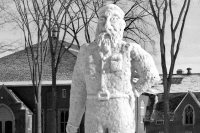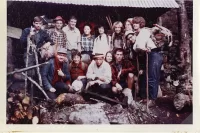
Ben Ayers ’99 has spent most of his working life in Nepal supporting sustainable economic development. He also has a recent and acclaimed National Geographic film documentary to his credit.
And if you ask him, he might say that the secret to his success was being a bad ski jumper in high school.
To kick off the Bates Outing Club’s 100th anniversary year, Ayers, a BOC president as a student, visited campus on Jan. 15 to share stories and lessons from his path from Bates to Nepal, including the ability to “let go” that got him to where he is today.
Spirits were high at the event, held in the Benjamin Mays Center, during which Ayers was honored with the Alumni Association’s Alumni Community Service Award. Students, having just returned to campus from break, shared stories about their vacation adventures. And they weren’t the only ones reuniting: BOC alumni from the last 50 years shook hands with friends, met current students, and mingled over Bates’ famous chai and cookies.
Ayers began his talk with a story about ski jumping. Growing up in New Hampshire — the only U.S. state to offer ski jumping as a high school sport — Ayers was excited to give it a shot.
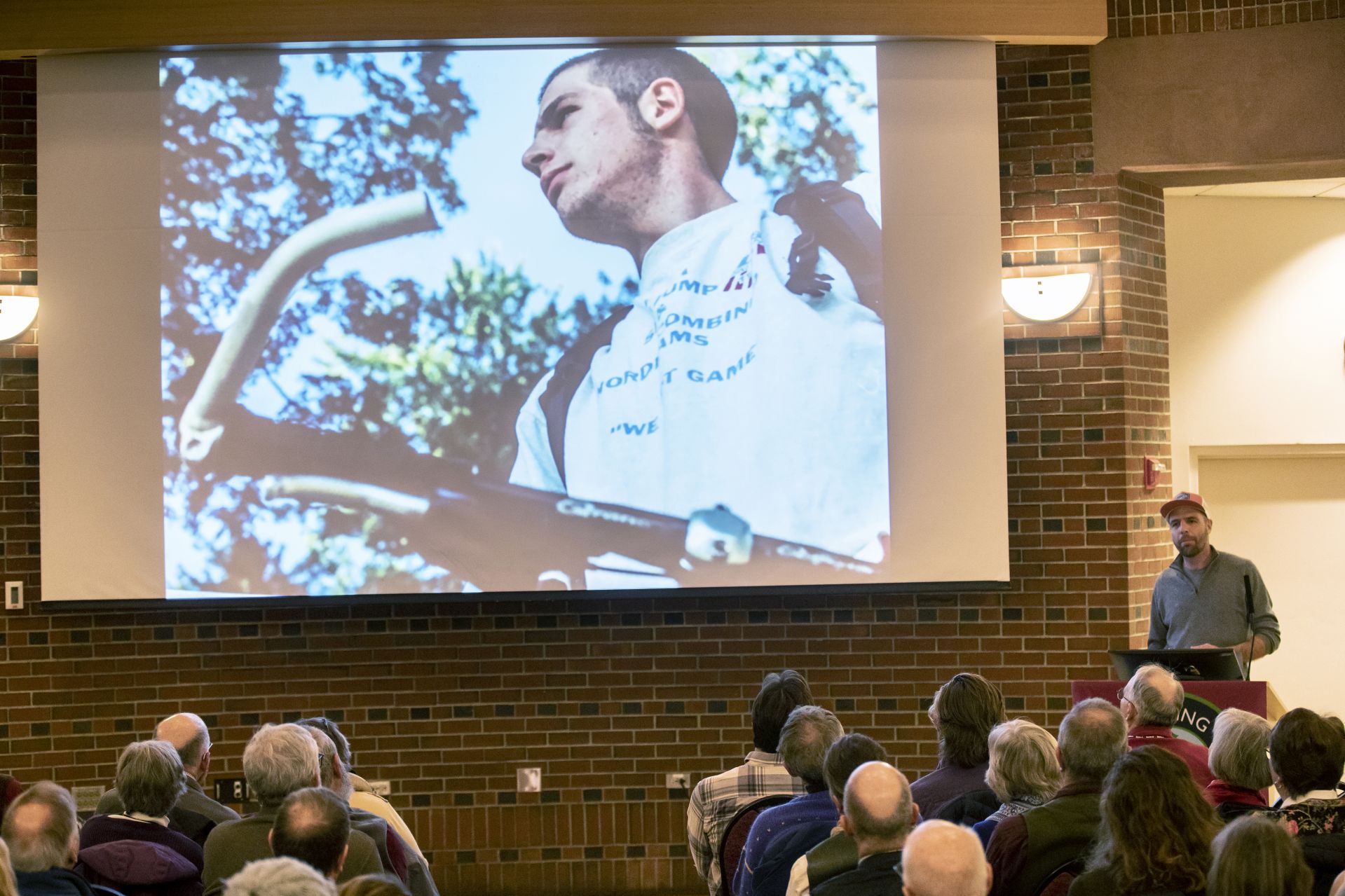
Standing before a projected photo from his high school ski-jumping days, Ben Ayers ’99 speaks during a Bates Outing Club 100th anniversary kickoff event on Jan. 15 in the Benjamin Mays Center. (Phyllis Graber Jensen/Bates College)
But no matter how hard he practiced and how much he envisioned himself making perfect jumps, he never improved. Discouraged, he stopped going to practice and, more importantly, stopped caring whether or not he was any good.
Only then did he begin to excel, eventually becoming one of the state’s top schoolboy ski jumpers.
Once he got to Bates, Ayers said, he “needed to find something else that I was bad at.” From his experience ski jumping, he knew he had an affinity for outdoor adventure, which led him to try rock climbing with the Outing Club.
Ayers explained how his roommate began teaching him to climb, and he devoted himself to it with the same “fervor and lack of skill.” By letting go of the need for instant perfection, and depending on help from friends, Ayers discovered that “adventure begets adventure.” He kept trying new things, immersed himself in new adventures, and excelled in ways he’d never thought possible.
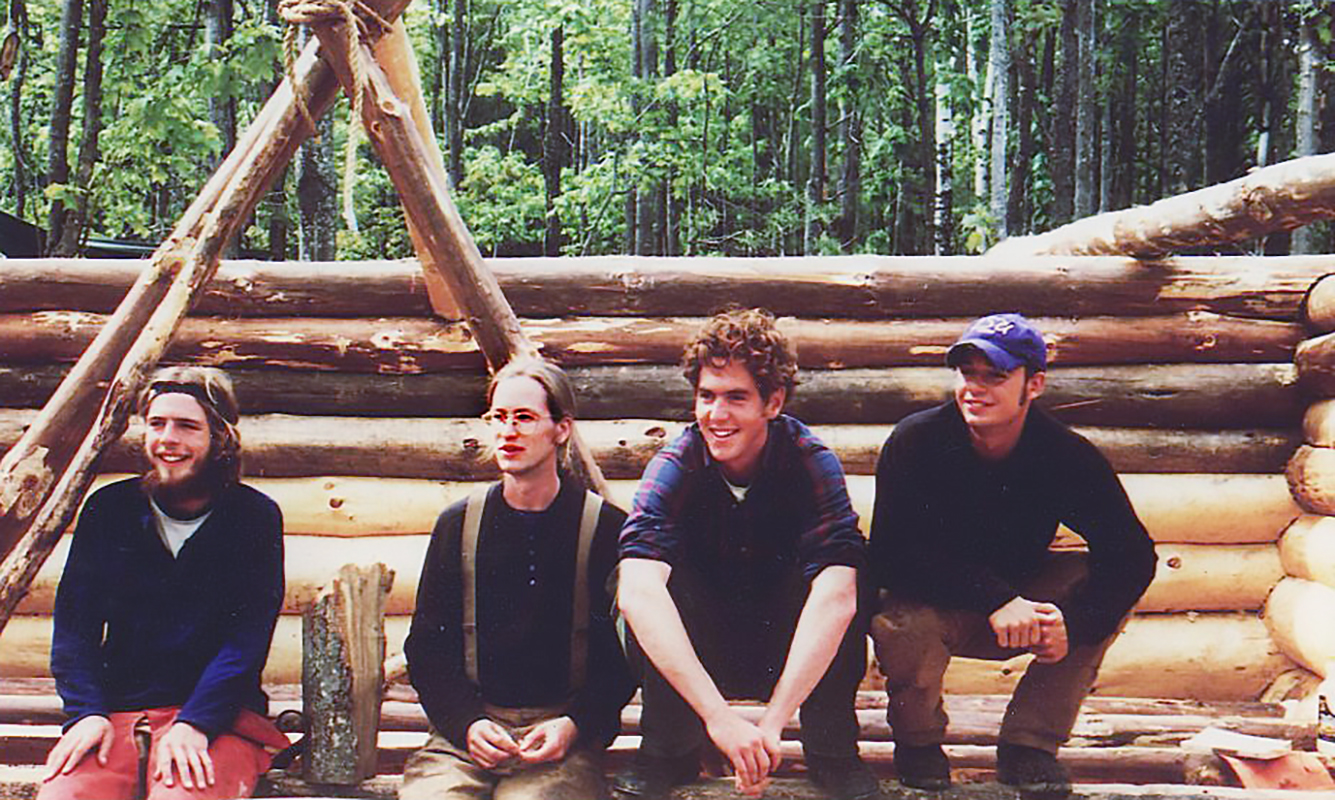
From left, 1999 classmates Ben Ayers, Brad Morse, Erik Thomson, and John MacKay pause during construction of the Bates Outing Club lean-to in May 1999. Located in nearby Greene on protected land provided by BOC adviser Judy Marden ’66, the 10-by-17 lean-to is modeled on Appalachian Trail structures. (Judy Marden ’66)
During his junior year, Ayers studied abroad in Nepal, unaware that it would entirely alter the course of his life. After graduating from Bates with an English major, Ayers moved back to Nepal with $300 (which was stolen from its oh-so-original hiding place in the hotel wall), and has been there pretty much ever since.
In 1999, Ayers founded a nonprofit, Porter’s Progress, to help supply Nepali porters with gear and medical skills to improve their safety in the Himalayas. He then went on to become the executive director of dZi foundation, through which he has worked in rural Nepal — building schools and improving agricultural, water, and sanitation systems — in order to, as he once said, help “develop the kind of prosperity that can make a community more resilient.”
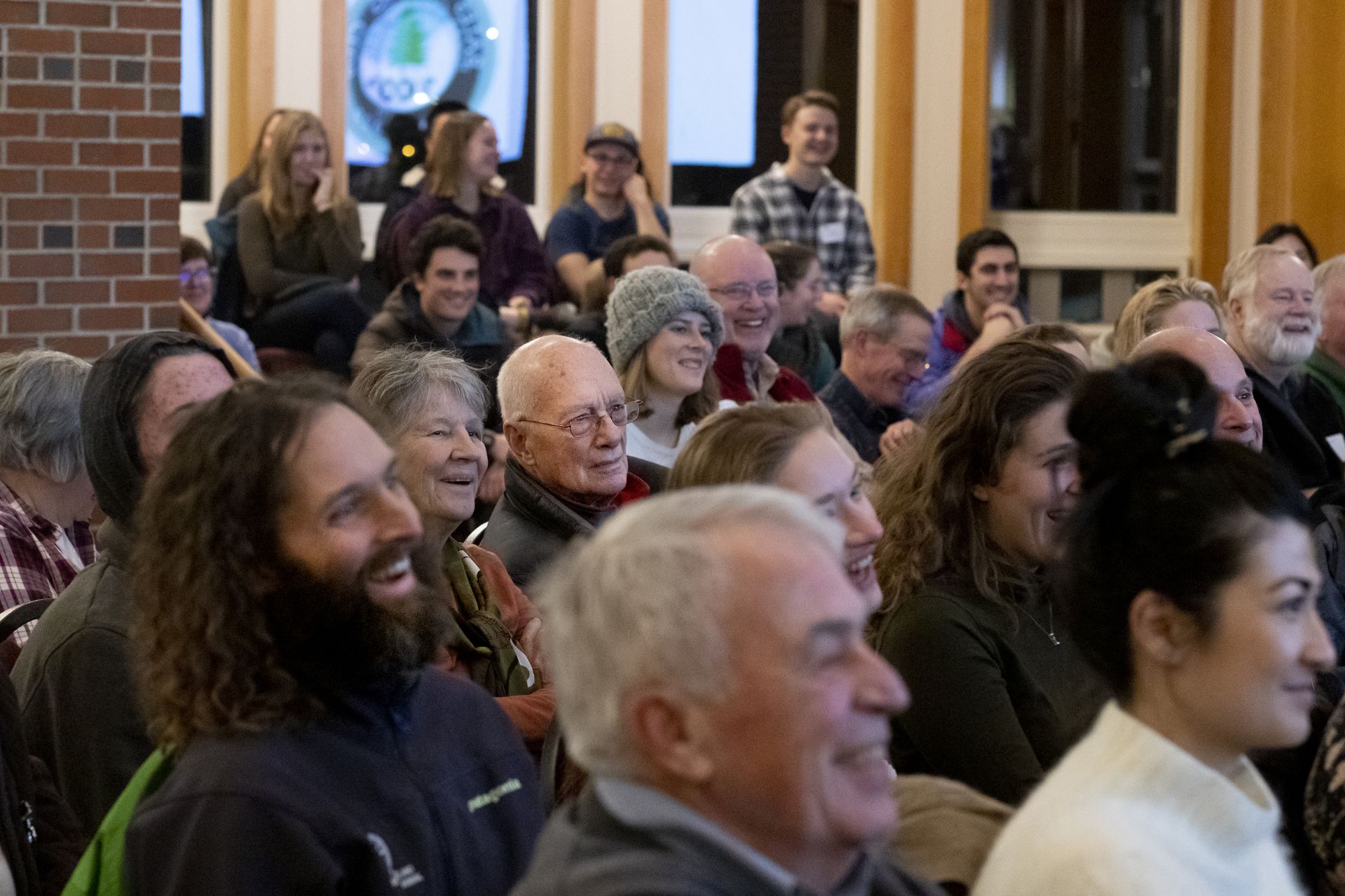
The large crowd, including many Bates Outing Club alumni and students, react to Ben Ayers’ talk on Jan. 15 at the Benjamin Mays Center. (Phyllis Graber Jensen/Bates College)
“We basically went to communities and asked them what their dreams for the next few years were,” Ayers told his Bates audience. Such as: “What was the beauty in their life? What was the strength in their life? What were their dreams for the future?” His goal was to help these communities build strengths to help themselves, and that’s what Ayers has been doing for the past 20 years.
In 2016, Ayers led a National Geographic documentary crew up cliffs, trailing Mauli Dhan Rai on his last foray to harvest so-called mad honey. He shared a bit about the years of establishing the friendships and trust necessary to film such a dangerous and sacred task.
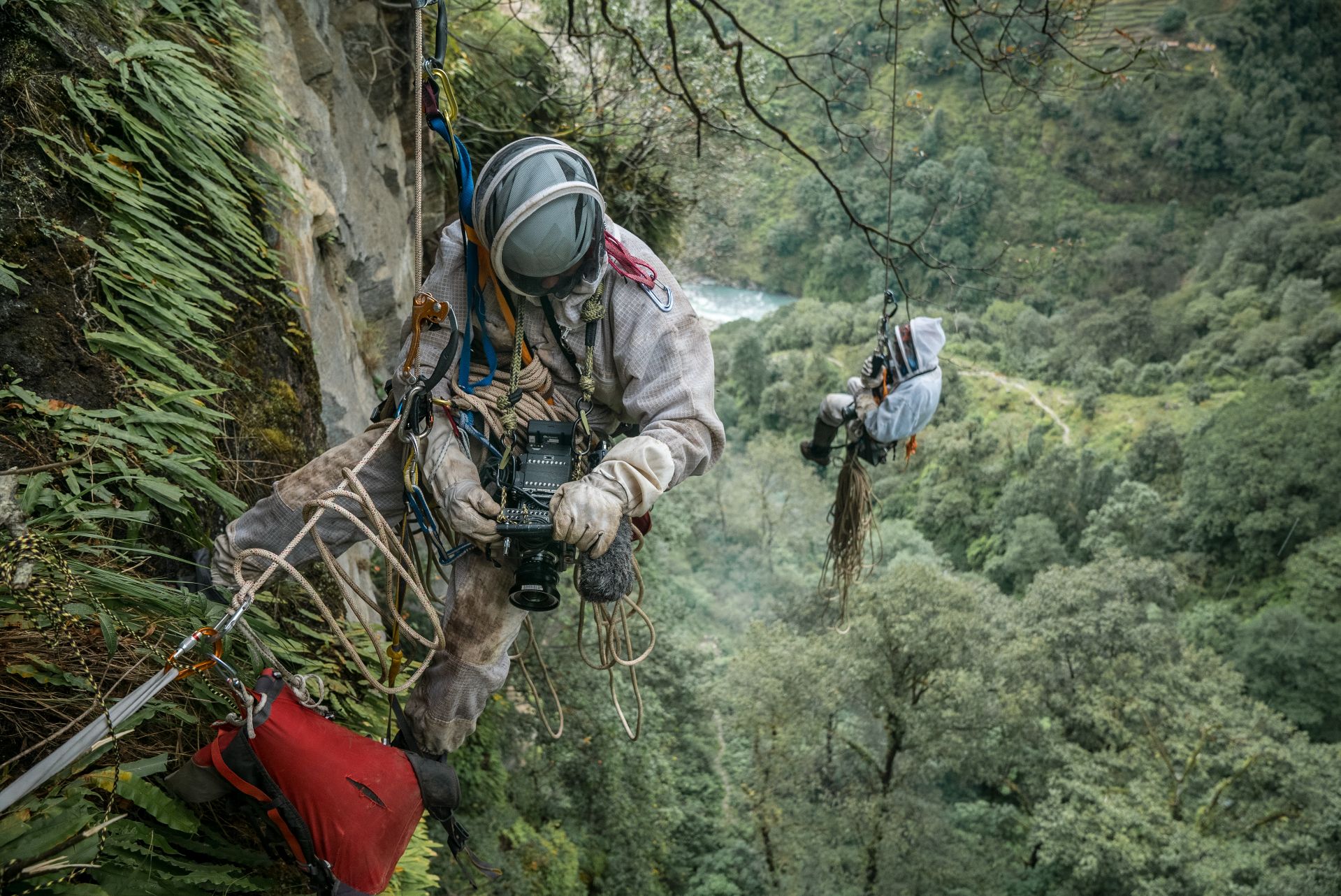
Wearing bee suits, photographer Renan Ozturk (left) and Ben Ayers ’99 prepare to capture Mauli Dhan Rai as he harvests a valuable hallucinogenic honey from a cliffside in Nepal’s Hongu River Valley. (Courtesy of Renan Ozturk)
“It all just happened because I choose to do things that I was really bad at,” he said. “I took a leap of faith that helped me learn and helped me listen, and it helped me connect with people who were different than I was.”
Trying things that we’re bad at, Ayers continued, also teaches us humility. “It’s important to be humbled.”
“By putting yourself in a position of being helped, you can then understand how to go about helping other people.”
He continued, “Not everyone has the privilege to travel. Not everyone has the opportunities to fail, and if you do, you have an obligation to. It’s going to teach you courage and it’s going to teach you fear.”
Ayers continued, “I’ve had the privilege to fail. I’ve had enough opportunity to try things I was bad at. And in doing that, I learned that at large, people are really forgiving, people are really understanding.”
Ayers also encouraged his audience to surround themselves with people who are different from them. “Put yourself in a position to accept help,” said Ayers. “By putting yourself in a position of being helped, you can then understand how to go about helping other people.”
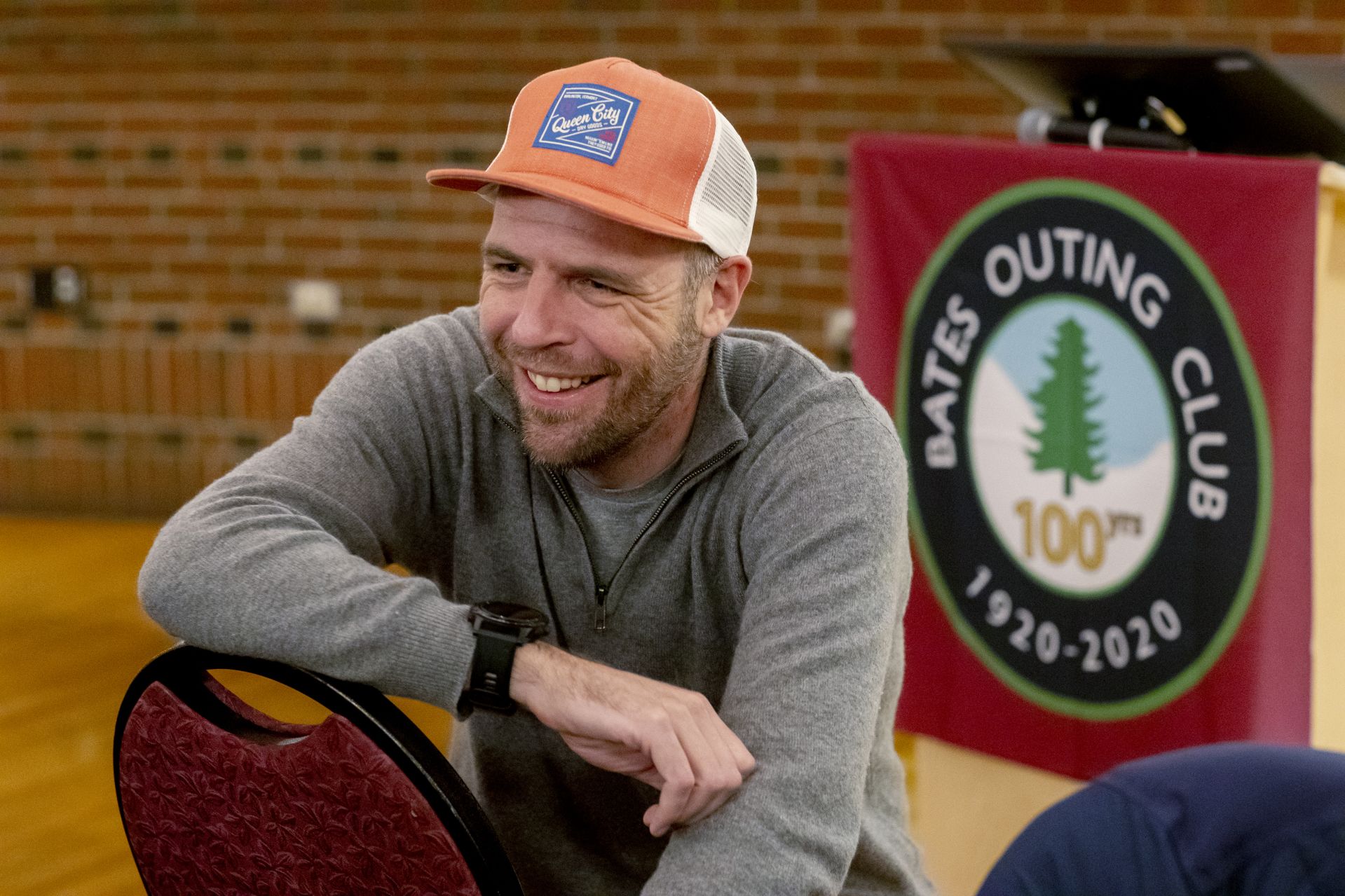
Ben Ayers ’99 chats with a friend prior to his Jan. 15 talk at the Benjamin Mays Center, kicking off the 100th anniversary of the Bates Outing Club. (Phyllis Graber Jensen/Bates College)
Early in the program, Ayers took time to thank Judy Marden ’66, longtime BOC adviser, for her years of dedication to the club. “Judy has been the North Star of the Outing Club long before I was a student,” Ayers said.
“I also want to thank Judy for remaining friends with me after I dragged her up to Everest base camp, and through the streets of Kathmandu on a motorcycle that I didn’t really know how to drive very well.”

